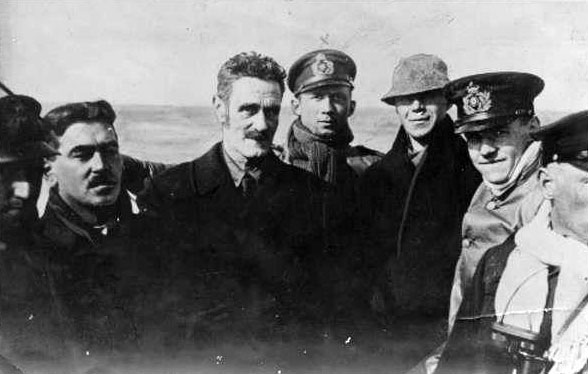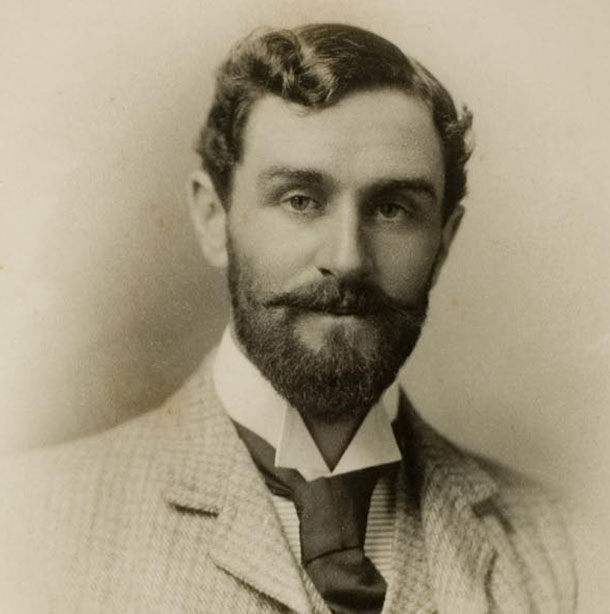20 November 2014
German aid for Rising – 20 November 1914
Remembering the Past from An Phoblacht/Republican News, 17 November 1994

• Roger Casement on a German submarine with Robert Monteith in April 1916
DURING the last 80 years, almost every generation of republicans has sought to enlist foreign support for the struggle in Ireland.
In the years prior to 1916, the assistance of Germany in supplying arms and ammunition for the Irish Volunteers was essential for the planning of the Easter Rising.
Following the success of the Howth gun-running in July 1914, when munitions were landed from the Asgard and the outbreak of the war in Europe the following month, the Irish Republican Brotherhood (IRB) lost no time in establishing direct contact with the German authorities.
Later that month, the first official overture to the German Government was made in New York, when John Devoy headed a Clan na Gael delegation to meet Count Von Bernstoff, the German Ambassador to America. Devoy told him that the Irish revolutionaries would take advantage of the war to strike for independence and would need arms and trained officers. This request was sent immediately to Berlin.
The German Government response was favourable. In October 1914, Roger Casement, who had helped plan the Howth landing, met the German Ambassador to America and travelled to Germany as the accredited envoy of Clan na Gael in the United States and the IRB in Ireland. His main objective was to form among Irishmen in the British Army, then prisoners in Germany, a brigade to travel to Ireland to take part in a rising there, secure a statement of German support and friendship for the cause of Irish independence, and to procure arms.

• Roger Casement
In November 1914, Casement secured a declaration of amity with Ireland from the German Government and the following month he negotiated an agreement for German aid to liberate Ireland.
Under this agreement, signed on 27 December between Casement (as Irish envoy) and the German Under Secretary for Foreign Affairs, Van Zimmermann, an Irish Brigade would be formed in Germany from among the Irish prisoners of war. The brigade would be established solely to fight for Ireland and would be landed in Ireland with arms and ammunition for the Volunteers.
In spite of the efforts by Casement and Robert Monteith, who was sent in June 1915 by Tom Clarke to Germany to assist him, only 55 of the 2,000 Irish prisoners, who were at Limburg, joined the brigade. Only one, Daniel J. Bailey, sailed with them on the ill-fated mission which ended in arrest at Banna Strand, County Kerry, on the eve of the rising.
In January 1916, Monteith, due to Casement's poor health, became the direct link between Devoy of the IRB and the German Government.
By March, Devoy, through Monteith, had arranged that the German Government would send a consignment of arms and ammunition to Ireland for the proposed rising on Easter Sunday, 23 April. The promised German aid in the form of an arms ship, the Aud, with a cargo of 2,000 rifles, ten machine guns, ammunition and explosives, set sail from Lubeck in Germany. The ship, however, had to be scuttled off the Kerry coast on Good Friday, 21 April, to avoid interception by the British navy.
The scuttling of the Aud, and the arrest of Casement and the others, ended almost two years of attempts to secure German aid for the Easter Rising of 1916 and the first constructive support from any European country for the struggle in Ireland for over a century.
Roger Casement, on behalf of the IRB, secured a formal declaration of support for the Irish national aspiration from the German Government on 20 November 1914.
Follow us on Facebook
An Phoblacht on Twitter
Uncomfortable Conversations

An initiative for dialogue
for reconciliation
— — — — — — —
Contributions from key figures in the churches, academia and wider civic society as well as senior republican figures




